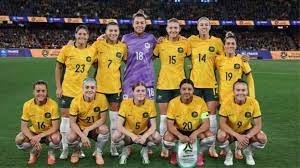
Three days prior to the tournament’s start, the Australian professional players union (PFA) posted a film featuring all 23 Matildas players.The team demanded that every member of Australia’s A-League Women be a true professional.
The Women’s World Cup is being co-hosted by Australia and New Zealand.
According to Clare Wheeler of Australia and Everton, “736 footballers have the honor of representing their countries on the biggest stage this tournament.”
Clare Hunt of the Western Sydney Wanderers continued, “Yet many are still denied the fundamental right to organize and engage in collective bargaining.”
Tameka Yallop, a midfielder for the Brann, stated: “Collective bargaining has allowed us to ensure that we now get the same conditions as the Socceroos, with one exception: Fifa will still only offer women one-quarter as much prize money as men for the same achievement.”The entire prize pool for the Women’s World Cup, which begins on Thursday, is $110 million (£84.1 million). This is a 300% increase from the previous competition, but it is still considerably less than the $440 million (£336.4 million) prize pool for the men in Qatar in 2018.
The minimum salary for A-League players climbed from $16,344 (£8,509) to $20,608 (£10,730) in the 2022–2023 season, and it is expected to raise once more to $25,000 (£13,011) in the following season.
There are 12 clubs in the league, and the regular season runs from November to April. The top four teams then compete in semi-final games, followed by a championship game.
According to Sydney FC’s Cortnee Vine, “Our sisters in the A-League are still pushing to make football a full-time career, so they don’t have to work part-time jobs like we had to.”
We were informed of the video’s distribution, according to Football Australia CEO James Johnson. But as Football Australia, we weren’t in the least bit concerned because we know that our program is among the best in the world, and we also know that the PFA and the players share that opinion.
However, there is always space for improvement. “Fifa-wise, [the increase in money] doesn’t get to where I think we are in Australia.”
Gianni Infantino, the president of Fifa, stated during the Fifa Congress in March that “our ambition is to have equality in payments for the 2026 men’s and 2027 women’s World Cup.” This is the goal we have for ourselves. Fifa is doing more than just talking the talk.
The governing body for football has also stated that equal prize money is its “ultimate aspiration” and that “we are on that journey.”
Cricket now has equal pay, according to the International Cricket Council, which made the announcement on July 13.
In 2019, the Matildas used their right to collective bargaining to reach a deal that provided them the same minimum cut of the country’s tournament prize money as the men’s team.
This happened after the women’s squad went on strike in 2015 to demand more wages.
The Football Association and England are engaged in a bonus dispute, so Australia is not the first team to raise the issue of equal compensation.
England defender Lucy Bronze described the scenario as “frustrating” after the governing body reportedly announced it would not give the Lionesses performance-based bonuses.
The Karen Carney study, in which the former England international said that the women’s game could be a “billion pound industry,” was referenced in the Matildas film.


Share your thoughts